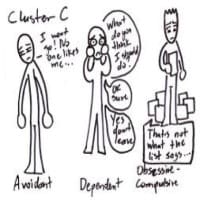
The Fearful/Anxious Personality Disorders: An Overview of Clusters C
$32.00
This course is no longer available
Cluster C personality disorders are characterized by anxious, fearful thinking or behavior. They include avoidant personality disorder, dependent personality disorder and obsessive-compulsive personality disorder. Professionals who participate in this training will benefit from learning about the symptoms, characteristics, biopsychosocial causes & risk factors, and complications of the personality disorder as we discuss literature and case studies.
Upon completion of this training, the participant will be able to:
- Determine the difference between the Fearful Personality Disorders & Discuss the history of PD diagnoses
- Identify the Psychological & Genetic Factors of each disorder
- Analyze & Conceptual the DSM – V Clinical Criteria and Definitions of Each Disorder: Determining a Diagnosis
- Assess Working with Fearful Personality Disorders – Implementing Pharmacology and Therapy
- Identify & Implement Effective Treatments for Working with and Managing Personality Disorders
Social workers completing this course receive 2 Clinical asynchronous continuing education credits.
For other board approvals, this course qualifies for 2 hours of Clinical, Trauma, Evidence Based Practices, and General Skill Building continuing education training.
Course Instructor: Stacy Blankenship, MSW, LCSW
Recording Date: 7/10/2024
Recorded Live Webinar with downloadable presentation slides and/or handouts, evaluation, and a required quiz. The learner is required to pass with a 70% or higher to achieve the CE certificate of completion. The learner is able to reset the test until a satisfactory score is achieved. CE Training Workshops, LLC, provider #1770, is approved as an ACE provider to offer social work continuing education by the Association of Social Work Boards (ASWB) Approved Continuing Education (ACE) program. Regulatory boards are the final authority on courses accepted for continuing education credit. ACE provider approval period: 8/2/2022 – 8/2/2025. CE Training Workshops, LLC has been approved by NBCC as an Approved Continuing Education Provider, ACEP No. 7091. Programs that do not qualify for NBCC credit are clearly identified. CE Training Workshops, LLC is solely responsible for all aspects of the programs. System Requirements: Firefox, Chrome, Brave, Safari, Edge on any modern operating system (Windows, MacOS, Linux, Android, iOS). A desktop browser is recommended. We do not provide support resources for issues encountered using a mobile device. For more information about our policies and board approval statements, please visit our FAQS page.
Stacy Blankenship, LCSW is a Licensed Clinical Social Worker and an intensively trained in Dialectical Behavioral Therapist completing her training at The Linehan Institute in 2015.
The Fearful/Anxious Personality Disorders: An Overview of Clusters C (2 HR) Syllabus
I. Introduction to Personality and Personality Disorders
- Define personality and how it relates to individual adjustment
- Review theories of personality including trait, psychoanalytic, humanistic, and social-cognitive models
- Define personality disorders and key diagnostic characteristics from the DSM-5-TR
II. Overview of Cluster C Personality Disorders
- Characterized by anxious and fearful behaviors
- Includes Avoidant, Dependent, and Obsessive-Compulsive Personality Disorders
- Frequently comorbid with anxiety, depression, and trauma-related disorders
III. Avoidant Personality Disorder (AvPD)
- Diagnostic features: social inhibition, feelings of inadequacy, hypersensitivity to criticism
- Common symptoms include extreme shyness, self-loathing, and fear of rejection
- Risk factors: childhood abuse or neglect, bullying, and emotional trauma
- Treatment approaches: CBT, schema therapy, group therapy, medication as needed
- Prognosis improves with gradual exposure and therapeutic alliance
VI. Dependent Personality Disorder (DPD)
- Diagnostic features: excessive need to be cared for, submissiveness, and fear of separation
- Symptoms include indecisiveness, clinging behavior, and discomfort when alone
- Risk factors: early trauma, attachment disruptions, and cultural or familial dynamics
- Treatment approaches: CBT, psychodynamic therapy, interpersonal therapy, assertiveness training
- Prognosis depends on developing autonomy, confidence, and supportive relationships
V. Obsessive-Compulsive Personality Disorder (OCPD)
- Key traits: preoccupation with orderliness, perfectionism, and control
- Distinction from OCD: ego-syntonic beliefs, absence of true obsessions/compulsions
- Common symptoms: rigidity, excessive devotion to work, reluctance to delegate
- Five proposed subtypes: perfectionistic, rigid/controlling, workaholic, hoarding, moralistic
- Treatment: CBT, psychodynamic therapy, Radically Open DBT (RO-DBT), mindfulness-based interventions
- Prognosis influenced by willingness to change and early intervention
VI. Etiological Factors Across Cluster C Disorders
- Genetic predispositions and neurobiological vulnerabilities
- Childhood trauma, neglect, and family dynamics
- Social, psychological, and cultural influences on personality development
VII. Comorbid Conditions and Differential Diagnosis
- Common comorbidities: depression, anxiety disorders, OCD, eating disorders, substance use
- Importance of accurate diagnosis and awareness of overlapping symptoms
VIII. Summary and Clinical Considerations
- Cluster C disorders often manifest in early adulthood with long-term impacts
- Effective treatment involves skill-building, emotional support, and flexible, person-centered approaches
- Emphasis on empathy, psychoeducation, and validation in therapeutic relationships


